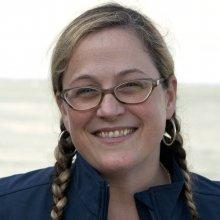
Jenny Woodman
Tell us about your work/research. What kinds of things do you do?
After four years covering ocean health and technology for a small NASA-sponsored publication, I'm in the midst of launching Proteus Science Communication, a nonprofit platform focused on science and storytelling for a blue planet. Our mission at Proteus is to connect a science-curious audience with STEM professionals, writers, and artists working in the oceanic community through storytelling, writing workshops, and community outreach. Our primary goals are to build critical science literacy and to engage the public with the ocean--our planet’s life support system. My writing can be found in OES Beacon, IEEE Earthzine, Portland Monthly, The Atlantic, and Ensia Magazine. I am also an adjunct writing instructor at Portland Community College where I help my students develop skills for research and writing at a college level.
What sparked your initial interest in your career?
I don't think I had much of a choice when it came to writing and teaching -- this is what I was meant to do. But, finding my niche and figuring out what I wanted to write about was daunting. A mentor suggested I try my hand at science writing because I was enjoying those courses. Once I dipped my toes in those waters, I was hooked. Science and technology are rich areas for exploration -- it is impossible to run out of material about which to write, and the challenges of translating complex concepts keep me on my toes every day. Writing is a vehicle for learning, for staying curious about the world around me. Storytelling requires in-depth research, thoughtful study, and creative thinking. I find the immersive process of constructing a story deeply satisfying because I end (almost) every article knowing just a little bit more about the subject and my own craft.
Who influenced you or encouraged you the most?
I've been fortunate to have wonderful mentors and teachers. At Portland State, Cindy Lou Coleman was a gifted professor and role model -- her work examining media framing, science, and Native American perspectives continues to make me think about the way I write about people and science. And, I'm grateful to have had Paul Collins (also at Portland State) as a teacher and thesis advisor; he encouraged me to try science writing, which opened up all of these doors for me personally and professionally. Lastly, my husband is a true partner who supports all my efforts with grace and tenderness.
What element of your work/study do you think is the most fascinating?
Meeting so many brilliant people who are working to build technologies or unearth the answers to questions about the Earth and life in this universe is a pretty good thing to wake up to each day.
What other jobs led you to your current career?
I've taken a rather circuitous route from the restaurant world in my hometown of Philly to my life today as a science writer in the Pacific Northwest. Perhaps the only constant is this: whatever I did, I worked hard and took advantage of all the opportunities that these labors provided. From traveling to Italy to learn about food and wine to taking honors courses in college and earning a full-ride scholarship for part of my undergraduate and all of my graduate schooling
What are your degrees and certifications?
Bachelor of Science in Communications Studies -- Portland State University 2014; Master of Fine Arts in Creative Writing -- Portland State University 2016
What are your hobbies?
When I'm not writing or teaching, I can be found exploring the Oregon coast, camping around Mt. Hood, cooking elaborate meals with my husband David, or knitting on my porch with my black lab, Gus.
What advice would you give to someone who wants to have a career like yours?
Take risks and big leaps. I was so afraid when I returned to college after 20 years. When I think back on the last eight years, it felt like there was something huge and insurmountable at each turn, but I went for it anyway. I applied for so many scholarships and opportunities that didn't pan out. There were gut-wrenching disappointments, but I didn't give up and amazing new paths emerged. I graduated with honors and landed a NASA fellowship that turned into a great job. And now, I'm in the Corps of Exploration helping others explore the ocean. What could be cooler than that?
How did you get involved with the Nautilus Exploration Program? How did you get on the ship?
I learned of the science communication fellowship while searching for artist residencies connected to science. As a writer, I was hungry for opportunities to get out there and escape the trap of laptop research; joining the Corp, going to sea, and exploring the ocean with robots has been an epic experience -- I can't wait to get back out there again!
Expeditions
Jenny participated in the following Ocean Exploration Trust expeditions:
